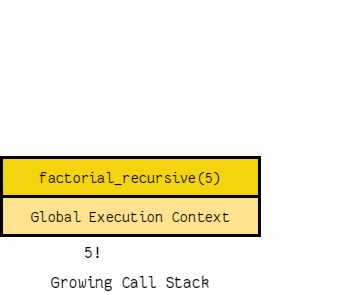reading-notes
Class 04
Classes and Objects
Objects- Encapsulation of variables and functionsClasses- Template for objects
class MyClass:
variable = "blah"
def function(self):
print("This is a message inside the class.")
myobjectx = MyClass()
- Access object variable:
myobjectx.variable - Access object function:
myobjectx.function()
Thinking Recursively
- Divide problem into subproblem
- Call itself to solve them
Structure
- Base case
- Recursive case
Example
n!
def factorial_recursive(n):
# Base case: 1! = 1
if n == 1:
return 1
# Recursive case: n! = n * (n-1)!
else:
return n * factorial_recursive(n-1)
Stack
- Each recursive call adds to call stack
- Added until hit base case
- Solve base case and worth back through stack

State
- Each calls runs in own execution context
- State needs to be maintained through calls
Options
-
Thread state through each call
def sum_recursive(current_number, accumulated_sum): # Base case # Return the final state if current_number == 11: return accumulated_sum # Recursive case # Thread the state through the recursive call else: return sum_recursive(current_number + 1, accumulated_sum + current_number) -
Maintain state inn global scope
# Global mutable state current_number = 1 accumulated_sum = 0 def sum_recursive(): global current_number global accumulated_sum # Base case if current_number == 11: return accumulated_sum # Recursive case else: accumulated_sum = accumulated_sum + current_number current_number = current_number + 1 return sum_recursive()
Data structures
- List
- Tree
- Dict
List Sum Example:
# Base case
if input_list == []:
return 0
# Recursive case
# Decompose the original problem into simpler instances of the same problem
# by making use of the fact that the input is a recursive data structure
# and can be defined in terms of a smaller version of itself
else:
head = input_list[0]
smaller_list = input_list[1:]
return head + list_sum_recursive(smaller_list)
>>> list_sum_recursive([1, 2, 3])
6
Pytest
Source: Python Testing with pytest: Fixtures and Coverage
Fictures
- Allows data to be shared across tests
- Use
pytest.fixturedecorator
Function
def reverse_lines(f):
return [one_line.rstrip()[::-1] + '\n'
for one_line in f]
Fixture
- provides data to test
- similair to defining global variable
- acts like a variable (not invoked with ())
- executes when test runs
@pytest.fixture
def simple_file():
return StringIO('\n'.join(['abc', 'def', 'ghi', 'jkl']))
- or, decide how often it runs
@pytest.fixture(scope='module')
def simple_file():
return StringIO('\n'.join(['abc', 'def', 'ghi', 'jkl']))
Coverage
Indicates a reasonable degree of test coverage (cases to test)
- package:
pytest-cov - coverage report:
pytest --cov=mydirectory - make it readable:
coverage html- open
htmlcov\index.html
- open